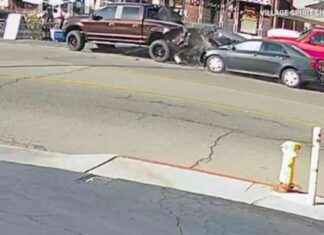The main French farmers’ unions yesterday asked their affiliates to end the blockade they have maintained on numerous motorways for days, including the eight that converge in Paris, after the Government made new promises to improve the sector and that Brussels announced a few measures to counter the discontent.
The protest had reached its climax and it was a good time to lower the tension, under penalty of a violent drift that no one wanted. Groups of farmers and ranchers achieved their goal of reaching the large central market of Rungis, south of Paris, on Wednesday. A hundred entered the premises without permission and were arrested. Yesterday the protest reached the vicinity of the National Assembly. Meanwhile, hundreds of tractors headed for Brussels, where they joined farmers and ranchers from other countries to demonstrate in front of the European institutions. There were some clashes with riot police, partly due to the infiltration of radical elements of the black blocs.
The call to suspend the protest, at least the most aggressive part, because the pressure will continue by other means, was made by the president of the main union, the FSNEA, Arnaud Rousseau, and the Young Farmers, Arnaud Gaillot. The union leaders wanted to give a vote of confidence to the Government, although they conditioned the effective demobilization on the fact that the Government put in writing, in detail and with clarity, its new announcements from yesterday. There are minority unions that were not satisfied and were reluctant to leave the struggle.
At the checkpoints on the highways, where the farmers had set up real camps, with perfect logistics, a certain skepticism reigned at first. Many of them never even saw Attal on television or heard him on the radio. Other times they were disappointed or had a hard time deciphering some very rhetorical statements and separating the wheat from the chaff, but fatigue was setting in and everyone, deep down, wanted at least a truce to go back to the farms and take care of the cattle , a job that does not allow pause.
Attal appeared with the heads of Economy and Finance, Bruno Le Maire, and of Agriculture, Marc Fesnau, to explain another package of legislative, administrative, financial and fiscal measures that should benefit those working in the primary sector.
The Prime Minister emphasized that the principle of French food sovereignty will be enshrined in law, with annual monitoring of compliance. An extra aid of 150 million euros was announced for livestock farming, as well as maximum exemption from taxes on the inheritance of agricultural holdings to facilitate generational relief, today in danger. In total, the Government estimates the amount of the agreed emergency measures at 400 million euros.
Le Maire said mass checks will be carried out at supermarket chains and collective buying centers to ensure compliance with a law aimed at guaranteeing a fair price for French producers, whatever the market conditions at any given time. The Minister of Economy also said that the French origin of food will be strictly controlled, when this information appears on the label, so that there is no fraud, for example with chicken, half of which comes from outside the country, mostly Poland and Ukraine. The fine for this type of fraud can reach 10% of the turnover of the company that commits it.
Along with the concessions on a national scale, there were gestures by the European Commission to appease the French anger, including the tariff measures that each State could adopt to avoid an excess of imports from Ukraine or the repeal of the norm mandatory to keep 4% of the arable surface fallow.
The blocking of numerous motorways and the destruction of the cargo of some trucks had provoked the indignation of transporters from neighboring countries and diplomatic protests, especially due to the frequent inaction of the French police. It is a flagrant violation of the right to free movement in the EU. There are groups of trade unionists who have arrogated to themselves the right to inspect trucks to verify the origin of the product they transport.
The Spanish Confederation of Goods Transport (CETM) denounced in a statement yesterday the violence and assaults suffered by its drivers, who have faced “situations of extreme tension”. “Every day our trucks are looted and looted; drivers are afraid to drive because the demonstrators threaten and insult them”, lamented the CETM.








